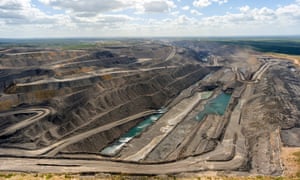As first case of Covid-19 confirmed of a Bowen Basin coalminer, locals call for tighter restrictions on the movement of workers
Community leaders in central Queensland
say they fear it is now “too late” to impose tougher restrictions on
the mass movements of workers heading to isolated mining communities,
after the first coronavirus case was confirmed of a Bowen Basin
coalminer.
Locals in towns including Moranbah, Clermont and Emerald have told Guardian Australia they are increasingly anxious that large numbers of remote workers continue to cycle through camps and mine sites on a weekly basis. Some are refusing shifts out of concern for their health.
BHP confirmed on Friday that a Rockhampton-based worker at the BHP-Mitsubishi Alliance Blackwater mine had tested positive for Covid-19. He was last at the mine site on 1 April.
Anne Baker, the mayor of the Isaac Regional Council, which covers the
northern section of the Bowen Basin, said isolated resources
communities would be devastated by any potential outbreak.Locals in towns including Moranbah, Clermont and Emerald have told Guardian Australia they are increasingly anxious that large numbers of remote workers continue to cycle through camps and mine sites on a weekly basis. Some are refusing shifts out of concern for their health.
BHP confirmed on Friday that a Rockhampton-based worker at the BHP-Mitsubishi Alliance Blackwater mine had tested positive for Covid-19. He was last at the mine site on 1 April.
Baker said the situation was also a risk to mine operators, who would be forced to cease operations if workers on site became infected.
“For weeks now we have been calling on [Queensland] government to implement tighter restrictions on mass movements of workers coming into region,” Baker said.
“Confirmed community transmission is too late to trigger stronger action.
“Our regional health system, the critical resources industry and our hard-working communities will all be devastated by an outbreak in our regional areas where mining continues to underpin the national economy.”
“Get them into our region healthy and safely, and keep them here longer as has been adopted within resources industry in other states.”
It is understood the infected mineworker travelled from Rockhampton to Blackwater and back by bus during his last roster period, returning on 1 April. Any colleagues who had potential contact with the man have been placed into isolation as a precaution.
BHP said in a statement that the worker’s diagnosis was due to the successful operation of screening processes for remote workers before they return to mine sites. It said strict social distancing, hygiene and cleaning practices were in place at the mine.
The CFMEU mining and energy division’s Queensland president Stephen Smyth has raised concerns about “multiple points of potential cross-contamination”, including on machinery, transport to mine sites, mess facilities and camp accommodation.
“Workers across the whole operation needed reassurance that all of these risks have been identified, that they are being managed, and that all potential exposure will be appropriately tracked,” Smyth said.
The Queensland government this month closed its borders to non-essential fly-in workers, but large numbers continue to cycle through communities from Brisbane, the Gold Coast, Townsville, Mackay and Rockhampton.
Among miners, the situation has exposed a schism dividing many of those who base themselves in nearby communities and those who live remotely and stay in camps during their roster periods.
Many locals are fearful of the impact of any coronavirus outbreak in a remote location and want the regular stream of fly-in and drive-in workers stopped.
In Moranbah, for instance, there are seven hospital beds, two ventilators and no intensive care unit. A local GP, Margaret Swenson, told the ABC last week that if coronavirus spread to work camps “then we’re in real strife”.
A drive-in, drive-out worker based at Mackay told Guardian Australia he was considering declining future work over concerns about incidental contamination on transport to mine sites.
“From what I’ve seen the mining companies are going so far out of their way to keep people doing the right thing,” he said.
“I’m sure they have stopped 99% of contacts. But I still look around every time and think, if one bugger has the virus then there’s no way they can do anything to stop more people getting it.
“It’s starting to get heated too, some of the stuff that’s said to [drive-in, drive-out] guys, or some of the stuff you read on social media. There’s always a bit of a divide between the two groups but it’s almost nasty. If one person does the wrong thing then we’ll all be blamed.”
Baker said the solution was to drastically reduce movements of people by seeking to house remote workers in mining communities for the foreseeable future.
“It will be hard for workers to live away for extended periods of time, however this may be a small price to keep families safe, workers employed and doing their essential role to support an economy desperate for productivity,” Baker said.
“We must keep the mines open and people in jobs, but not at the expense of lives.”

No comments:
Post a Comment